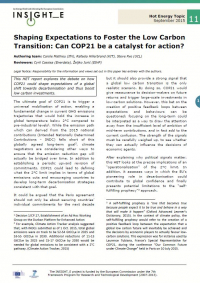Gateway to Think Tanks
| 来源类型 | Publications - External Publications - External Articles |
| 规范类型 | 其他 |
| Shaping Expectations to Foster the Low Carbon Transition: Can COP21 be a catalyst for action? INSIGHT_E Hot Energy Topic #11 | |
| Carole MATHIEU; , Rafaela HILLERBRAND (KIT), Steve PYE | |
| 发表日期 | 2015-11-18 |
| 出版年 | 2015 |
| 概述 | This report explores the debate on how COP21 could shape expectations of a global shift towards decarbonisation and thus boost low carbon investments. |
| 摘要 |
Shaping Expectations to Foster the Low Carbon Transition: Can COP21 be a catalyst for action? INSIGHT_E Hot Energy Topic #11
This report explores the debate on how COP21 could shape expectations of a global shift towards decarbonisation and thus boost low carbon investments.  The ultimate goal of COP21 is to trigger a universal mobilisation of action, enabling a fundamental change in current GHG emissions trajectories that would hold the increase in global temperature below 2°C compared to pre-industrial levels1. While the emission path which can derived from the 2015 national contributions (Intended Nationally Determined Contributions - INDC) falls short of this globally agreed long-term goal2, climate negotiators are considering other ways to ensure that the emission reduction gap will actually be bridged over time. In addition to establishing a periodic upward revision of commitments, COP21 could lead to defining what the 2°C limit implies in terms of global emissions cuts and encouraging countries to develop long-term decarbonisation strategies consistent with that goal. It could be argued that the Paris agreement should not only be about securing countries’ individual commitments for the next decade but it should also provide a strong signal that a global low carbon transition is the only realistic scenario. By doing so, COP21 would give reassurance to decision-makers on future returns and trigger large-scale investments in low-carbon solutions. However, this bet on the creation of positive feedback loops between expectations and behaviours can be questioned; focusing on the long-term could be interpreted as a way to draw the attention After explaining why political signals matter, this HET looks at the precise implications of an “operationalisation” of the 2°C limit. In addition, it assesses ways in which the EU’s pioneering role in decarbonisation could contribute to global confidence and finally presents potential limitations to the “selffulfilling prophecy” approach.
Shaping Expectations to Foster the Low Carbon Transition: Can COP21 be a catalyst for action?
|
| 关键词 | COP21 |
| URL | https://www.ifri.org/en/publications/publications-ifri/articles-ifri/shaping-expectations-foster-low-carbon-transition-can |
| 来源智库 | French Institute of International Relations (France) |
| 资源类型 | 智库出版物 |
| 条目标识符 | http://119.78.100.153/handle/2XGU8XDN/416073 |
| 推荐引用方式 GB/T 7714 | Carole MATHIEU,, Rafaela HILLERBRAND . Shaping Expectations to Foster the Low Carbon Transition: Can COP21 be a catalyst for action? INSIGHT_E Hot Energy Topic #11. 2015. |
| 条目包含的文件 | ||||||
| 文件名称/大小 | 资源类型 | 版本类型 | 开放类型 | 使用许可 | ||
| het11.jpg(59KB) | 智库出版物 | 限制开放 | CC BY-NC-SA |  浏览 | ||
| het11_vf.pdf(237KB) | 智库出版物 | 限制开放 | CC BY-NC-SA | 浏览 | ||
除非特别说明,本系统中所有内容都受版权保护,并保留所有权利。